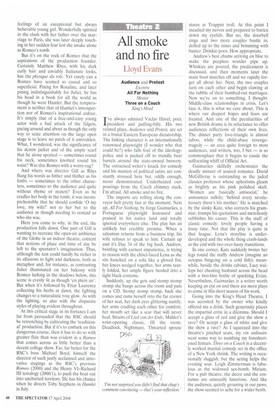All smoke and no fire
Lloyd Evans
Audience and Protest Etcetera All For Nothing Menier Three on a Couch King's Head I've always admired Vaclav Havel, poet, president and puffing-billy. His two related plays, Audience and Protest, are set in a brutal Eastern European dictatorship. The linking character is an internationally renowned playwright (I wonder who that could be?) who falls foul of the ideologypolice and is packed off to trundle beer barrels around the state-owned brewery. The ostracised writer's knack for comedy and his mastery of political satire are constantly stressed here but, oddly enough, never demonstrated. Underheated outpourings from the Czech chimney stack, I'm afraid. All smoke and no fire.
The imports are rolling along the conveyor belt pretty fast at the moment. Next up, All For Nothing, by Jorge Guimardes, a Portuguese playwright honoured and praised in his native land and totally ignored everywhere else. The play has an unlikely but credible premise. When a salesman returns from a business trip, his wife refuses to speak to him. Curtain up and it's Day 34 of the big hush. Andrew, bristling with earnest impatience, is trying to reason with the chisel-faced Lena as she sits hunched on a sofa like a gloved fist, her knees wedged together, her arms tautly folded, her ample figure herded into a tight black costume.
Suddenly, up she gets and stomp stomp stomp she bangs across the room and puts on a CD. Stomp stomp stomp, back she comes and rams herself into the far corner of her seat, her dark eyes glittering nastily, her arms cradling each other for comfort, her mouth set like a scar that will never heal. Strains of Lied von der Erde, Mahler's wrist-opening classic, fill the room. Deadlock. Nightmare. Thwarted spouse
stares at Trappist troll. At this point I steadied my nerves and prepared to batten down my eyelids. But no, the doorbell rings and two more couples bustle in, dolled up to the nines and brimming with banter. Drinkie-poos. How appropriate.
Andrew's best chums arriving en bloc to make the peepless wonder pipe up. Whiskies are poured, the predicament is discussed, and then moments later the mute boot marches off and we rapidly forget all about her. Next, the two couples turn on each other and begin clawing at the rubble of their bombed-out marriages. Now we're on to something, I thought. Middle-class relationships in crisis. Let's face it, this is what we care about. This is where our deepest hopes and fears are located. And one of the peculiarities of new British drama is its reluctance to offer audiences reflections of their own lives. The dinner party love-triangle is almost taboo, while the child-abuse revengetragedy — an area quite foreign to most audiences, and writers, too, I bet — is so commonplace that it begins to exude the suffocating whiff of Official Art.
Guimardes skilfully orchestrates the deadly minuet of soured romance. David McGillivray is outstanding as the jaded classics professor whose aphorisms gleam as brightly as his pink polished skull. 'Women are basically antisocial,' he announces sulkily; 'behind every revolutionary there's his mother.' He is matched by the slinky Kate, who corrects his grammar, trumps his quotations and mercilessly rubbishes his career. This is the stuff of classic comedy: lovely people having a lousy time. Not that the play is quite in that league. Lena's storyline is underdeveloped and the whole thing crash-lands at the end with two over-hasty transitions.
In one corner, Kate suddenly twines her legs round the stuffy Andrew (imagine an octopus bingeing on a cold fish); meanwhile, beside the drinks cabinet, Lucy wallops her cheating husband across the head with a two-litre bottle of sparkling Evian. Nevertheless, Guimardes is a miter worth keeping an eye on and there are more plays to come in this short season of his work.
Going into the King's Head Theatre, I was accosted by the owner who kindly offered me a drink. Such generosity places the impartial critic in a dilemma. Should I accept a glass of red and give the show a rave? Or accept a glass of white and give the show a rave? As I squeezed into the theatre's pinched seats, my yin ordinaire went some way to numbing my foreshortened femurs. Three on a Couch is a decently worked marital comedy set in the office of a New York shrink. The writing is occasionally sluggish, but the acting helps the evening soar. Leigh Zimmerman is fabulous as the widowed sex-bomb, Miriam. For a pub theatre, the decor and the costumes are unusually luxurious. And like the audience, quietly groaning in our pews, the show seemed to ache for a wider berth.


































































 Previous page
Previous page